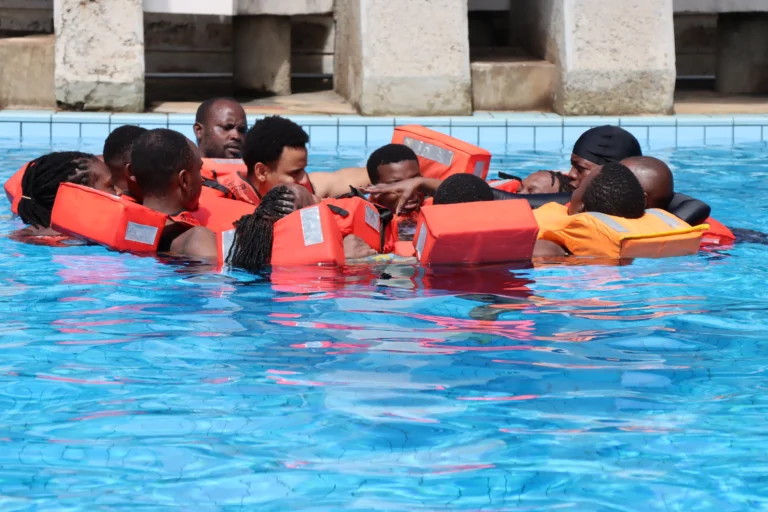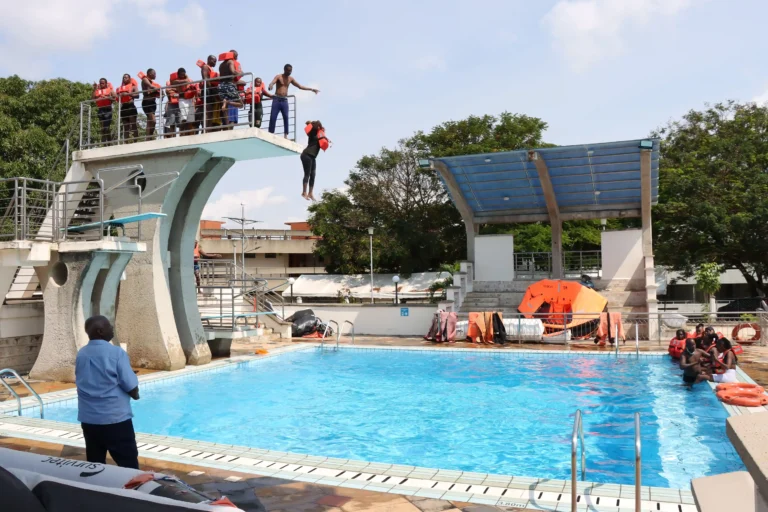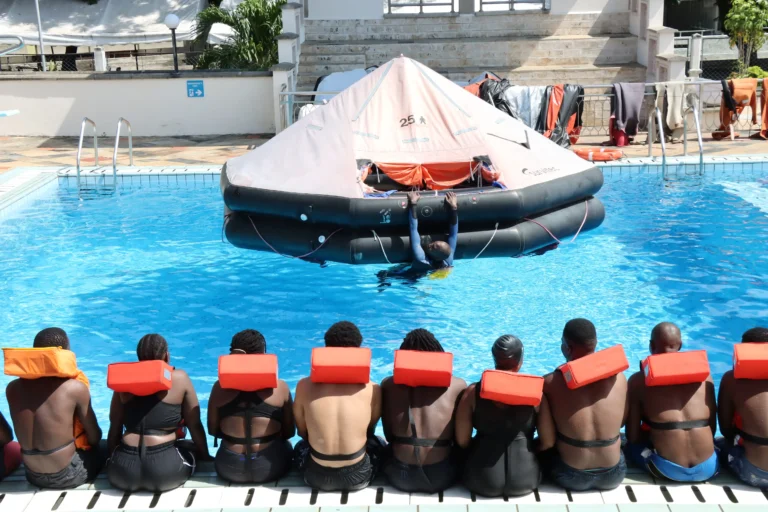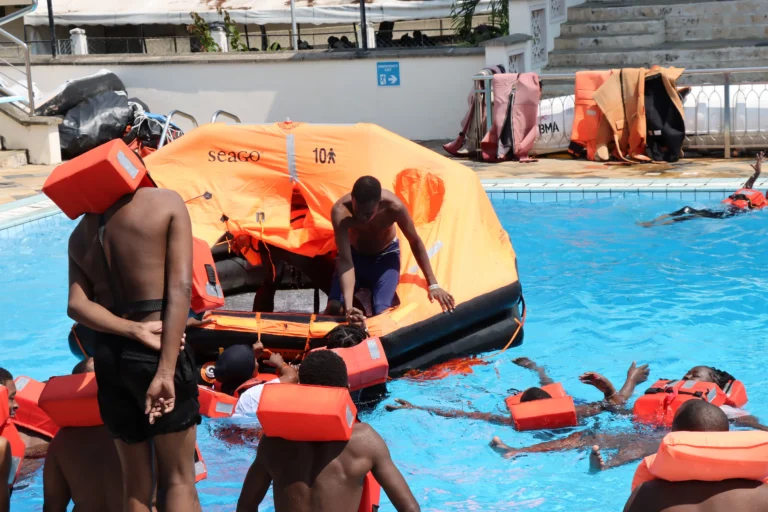The School of STCW and Ancillary at Bandari Maritime Academy (BMA) is dedicated to providing world-class training in seafarers with the essential education and skills required for safe and efficient maritime operations through theory in class and practical skills required in the maritime industry.
Our programs are designed to meet international standards and industry demands, equipping graduates with the knowledge in safety as provided in schools ensure that all personnel working at sea meet international standards set by the International Maritime Organization (IMO) under the STCW Convention (Standards of Training, Certification, and Watchkeeping for Seafarers). This enhances seafarers in Maritime Safety & Competency onboard ship.
Basic Safety and Security Training – Focuses on the fundamental principles of Fire Prevention, Personal Survival Techniques, First Aid, Personal Safety & Social Responsibility and Security Training.




Basic Safety Revalidation – This is a refresher course required under the STCW Convention (as amended, including the Manila Amendments 2010). It ensures that seafarers maintain their essential safety skills and knowledge to work effectively on board.
Coxswain Level III – This trains crew member responsibilities of operating and handling lifeboats, rescue boats, or small vessels in emergency situations and regular maritime operations. This qualification is also essential for seafarers involved in search and rescue, offshore operations, or emergency response on ships and offshore platforms
Elementary First Aid – This is a mandatory STCW training module designed to equip seafarers with basic medical skills to respond to injuries and medical emergencies at sea. It is a core component of the STCW Basic Safety Training (BST) and follows the International Maritime Organization (IMO) guidelines. It is also taught in Basic Safety and Security Training (BSST).
Personal Survival Techniques – This course is a mandatory component of the STCW Basic Safety Training (BST). It teaches seafarers how to survive at sea in the event of an emergency, such as ship abandonment or man-overboard situations. It is also taught in Basic Safety and Security Training (BSST).
Fire Prevention & Fire Fighting – This course is a mandatory component of the STCW Basic Safety & Security Training (BST). It prepares seafarers to prevent, control, and extinguish fires on board ships, ensuring safety for both crew and vessel. It is also taught in Basic Safety and Security Training (BSST).
Advance Fire Fighting – This course is designed for seafarers who have firefighting responsibilities beyond basic fire prevention. It builds upon the Fire Prevention & Fire Fighting (FPFF) course, focusing on advanced techniques, leadership in emergencies, and shipboard fire management.
Maritime Security Awareness – This course is a mandatory STCW training designed to equip seafarers with the knowledge and skills to recognize and respond to security threats on board ships and in port facilities. It aligns with the International Ship and Port Facility Security (ISPS) Code under the STCW Convention. It is also taught in Basic Safety and Security Training (BSST).
Lifeguard – This course trains individuals in water rescue, CPR, first aid, and emergency response to ensure safety at pools, beaches, and water environments. The course is designed for professional lifeguards, maritime personnel, and anyone responsible for water safety.
Scuba Diving – This training allows individuals to explore underwater environments safely. It’s a popular activity for recreation, marine research, and professional purposes like underwater construction, photography, or marine biology.
Passenger Ship Crisis Management & Human Behavior – This course is a specialized STCW training aimed at preparing crew members to manage emergencies on passenger ships, ensuring both passenger and crew safety during crisis situations. The course also addresses how human behavior affects emergency response and crowd control during critical situations.
Proficiency in Survival Craft and Rescue Boat – This course is a mandatory STCW certification designed to ensure seafarers are capable of operating survival craft and rescue boats in emergency situations. This training covers the launching, handling, and operation of life-saving appliances like lifeboats, life rafts, and fast rescue boats.
Crowd Management – This course focuses on how to handle large groups of passengers safely during emergencies aboard passenger ships. It is designed to ensure that crew members can manage passenger behavior, maintain order, and efficiently carry out emergency procedures during crisis situations.
Crisis Management – This course is an essential component of STCW training that prepares seafarers to handle emergency situations on board ships, ensuring the safety of passengers, crew, and the vessel during a crisis. It focuses on managing stressful and critical situations, coordinating crew members, and making critical decisions during emergencies such as fire, evacuation, or piracy threats.
Designated Security Duties – This course is part of STCW (Standards of Training, Certification, and Watchkeeping for Seafarers) and is designed to ensure that seafarers understand their responsibilities in maintaining security on board ships. This course is focused on the implementation of security measures, prevention of threats, and recognition of suspicious activities, particularly in accordance with the International Ship and Port Facility Security (ISPS) Code.
State-of-the-Art Training Facilities – Hands-on training using fire fighting simulation, Personal Survival Techniques, Elementary First aid, Survival Craft and Rescue Boat.
Experienced Faculty – Our instructors bring industry experience and academic expertise to deliver comprehensive training.
Industry Partnerships – Collaboration with shipping companies and regulatory bodies to enhance training and job placement.
Compliance with International Standards – Our programs align with IMO, STCW, and other maritime regulations.
Graduates of the School of Marine Engineering can pursue careers as:
CONTACT
Admissions: +254709665011
Office: +254709665000
Admissions: admissions@bma.ac.ke
Office: info@bma.ac.ke
P.O Box 99469 – 80107 – MOMBASA
Copyright © 2025 Bandari Maritime Academy